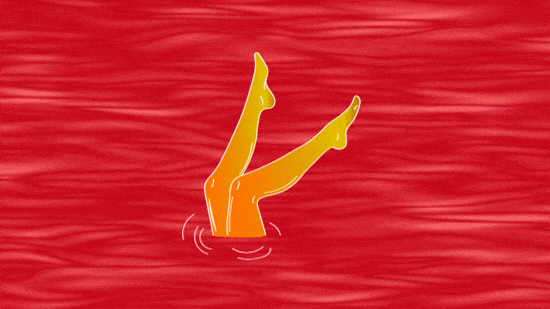Self-care. Billions of results pop up when you Google it. Social media is swarming with “self-care tips” and thought pieces with the phrase in their titles. The importance of valuing yourself and taking the time to care for your mental and physical health is finally beginning to permeate into mainstream consciousness. At the same time, however, throughout my adulthood thus far, taking care of myself has been directly linked to the care of someone else.
My dad had congestive heart failure in the winter of 2018, and underwent surgery to put in a temporary heart pump called an LVAD. He was discharged from the hospital the week of my eighteenth birthday, with an assortment of pills and medical equipment. Half a year later, he received a heart transplant.
When someone is an organ transplant recipient, they are prescribed immunosuppressants so that their body will not reject the new organ. Plainly put: my dad gets sick easily, and has difficulty recovering on his own—so much so that a bad cold put him in the hospital last summer. My family has lived a life of three-ply masks and frequent hand-washing for years. We have hand sanitizer on us at all times. We don’t allow anyone to come to our house unless they are vaccinated and are up to date on their flu shot. We take vitamins and herbs to boost our immune systems. The second one of us thinks we’re getting sick, even if it may just be seasonal allergies, we stay away from my dad and call the doctor.
The majority of caregivers for partners and family members are womxn (statistics ranging from 57% to 81%). With my brother living away and no close family nearby to help out, my mom and I are a part of this statistic. At the same time, the notion of self-care has been advertised as highly gendered, something that appeals to and is for womxn, particularly through its commodification. Although this can be empowering, if looked at in the context of the gender dynamics of caregiving, emotional labour, and stigma in seeking out mental health resources, it risks perpetuating the concept that men are to be nurtured by womxn, but womxn must nurture themselves. At least, this is true for my mother and I, both naturally independent and not conditioned to easily ask for help.
While my understanding of self-care became a series of individual actions or treats I gave myself (hot showers, face masks, the occasional splurge at the grocery store), health care became a source of anxiety. I would fear waking up with a sore throat and would feel guilty going about my day if I didn’t feel one hundred percent. If I got sick, my dad could get sicker. Even while away at university, I knew that I could not come home for breaks if I was not feeling well.
Illness is anxiety-producing to me because it can feel like something you can avoid through careful self-care —and in many ways it is — but it is also an inevitable part of life. Illness is built into the very system in which we operate: healthcare is a for-profit business in the United States. However, when I did feel ill or run a fever, I began listing all the things I did wrong, the “Self-care tips” I missed: the days I didn’t eat enough vegetables, the nights I didn’t sleep as well, the tea I didn’t drink. Getting sick in any way simultaneously felt out of my control and entirely my fault.
About three months after my dad’s initial surgery, I was getting over a small cold, but felt well enough to see a friend who was in from out of town. I came home that night with an intense earache. My mom drove me to an Urgent Care. We sat in the waiting room with masks on in complete silence. She was mad at me for going out when I wasn’t fully healthy, and therefore risking everyone in the house getting sick. When we finally saw the doctor, I burst into tears. The doctor and my mom were equally confused at this eighteen-year-old sitting before them, seemingly blubbering over a common ear infection. I was crying because I was angrier with myself for getting sick than my mother could ever be; I was crying because I was looking into the eyes of two people who I needed to take care of me, something I now felt guilty asking for; and I was crying because my ear fucking hurt and it’s okay to be mad at that too.
When we left Urgent Care that night, my mom drove me to the pharmacy for my antibiotics and then, to my surprise, pulled up in front of a Carvel. “We both need ice cream right now,” she said. My mindset surrounding my health shifted from a burden on my shoulders, to a family effort we all shared. Taking the time to care for myself remained important, but my family learned how to distribute this care and nurture each other. When one of us gets sick or needs a mental health break, the others step in. Communal health is not only about taking care of yourself for the sake of others or stepping up to care for people when you are able (though that is still valuable), but also asking for care when you need it.
You do what you can do: words the doctor told us when laying out the change in lifestyle we were about to undergo upon my father’s discharge. Thinking about my health and knowing that it might somehow impact my father is now permanently in the back of my mind, but the feelings of guilt and stress slowly began to fade as this lifestyle became normalized. My father will always be on immunosuppressants, but his dose has been slowly reducing over time. After a few months or so, our daunting list of precautions became part of our natural lifestyle and routine.
When COVID-19 hit North America, I went back home to be with my parents. During the month or so I’ve been home, the codependency of health became exacerbated. Living with an immunocompromised individual, in many ways, means that I must act like an immunocompromised individual. However, I have an advantage that not everyone else has: my health has been critically linked to another person’s well-being for two years. I have learned to see health as communal, a lesson others are still struggling to understand.
Story by Phoebe Fisher, New York


